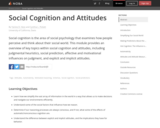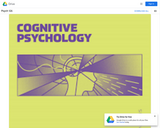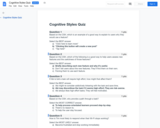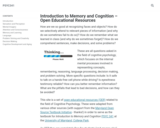
Ways to fix cognitive distortions (distorted thinking)
- Subject:
- Psychology
- Social Science
- Material Type:
- Lecture
- Author:
- Los Angeles Pacific University
- Date Added:
- 06/30/2021

Ways to fix cognitive distortions (distorted thinking)

Survey of principles underlying the structure and function of the nervous system, integrating molecular, cellular, and systems approaches. Topics: development of the nervous system and its connections, cell biology or neurons, neurotransmitters and synaptic transmission, sensory systems of the brain, the neuro-endocrine system, the motor system, higher cortical functions, behavioral and cellular analyses of learning and memory. First half of an intensive two-term survey of brain and behavioral studies for first-year graduate students.

Social cognition is the area of social psychology that examines how people perceive and think about their social world. This module provides an overview of key topics within social cognition and attitudes, including judgmental heuristics, social prediction, affective and motivational influences on judgment, and explicit and implicit attitudes.

Probability theory captures a number of essential characteristics of human cognition, including aspects of perception, reasoning, belief revision, and learning. Expressions of degree of belief were used in language long before people began codifying the laws of probability theory. This course explores the history and debates over codifying the laws of probability, how probability theory applies to specific cognitive processes, how it relates to the human understanding of causality, and how new computational approaches to causal modeling provide a framework for understanding human probabilistic reasoning.
This class is suitable for advanced undergraduates or graduate students specializing in cognitive science, artificial intelligence, and related fields.

This is a class about applying autonomy to real-world systems. The overarching theme uniting the many different topics in this course will center around programming a cognitive robotic. This class takes the approach of introducing new reasoning techniques and ideas incrementally. We start with the current paradigm of programming you're likely familiar with, and evolve it over the semester—continually adding in new features and reasoning capabilities—ending with a robust, intelligent system. These techniques and topics will include algorithms for allowing a robot to: Monitor itself for potential problems (both observable and hidden), scheduling tasks in time, coming up with novel plans to achieve desired goals over time, dealing with the continuous world, collaborating with other (autonomous) agents, dealing with risk, and more.

Explores the theory and research related to information processing, focusing on attention, perception, memory storage and information retrieval. Also highlights work in artificial intelligence and cognitive neuroscience which serves to describe and explain cognitive processes.

This course uses neuroscience methods to study the cognitive development of human infants and children. Case studies draw from research on face recognition, language, executive function, representations of objects, number and theory of mind.

This course is an introduction to cognitive development focusing on children's understanding of objects, agents, and causality. It develops a critical understanding of experimental design. The course discusses how developmental research might address philosophical questions about the origins of knowledge, appearance and reality, and the problem of other minds. It provides instruction and practice in written communication as needed for cognitive science research (including critical reviews of journal papers, a literature review and an original research proposal), as well as instruction and practice in oral communication in the form of a poster presentation of a journal paper.

Example of how instructors can share their cognitive styles with their class, with template.

This course is a survey of perceptual and cognitive aspects of the psychology of music, with special emphasis on underlying neuronal and neurocomputational representations and mechanisms. Basic perceptual dimensions of hearing (pitch, timbre, consonance/roughness, loudness, auditory grouping) form salient qualities, contrasts, patterns and streams that are used in music to convey melody, harmony, rhythm and separate voices. Perceptual, cognitive, and neurophysiological aspects of the temporal dimension of music (rhythm, timing, duration, temporal expectation) are explored. Special topics include comparative, evolutionary, and developmental psychology of music perception, biological vs. cultural influences, Gestaltist vs. associationist vs. schema-based theories, comparison of music and speech perception, parallels between music cognition and language, music and cortical action, and the neural basis of music performance.

Extra credit assignment about the Cognitive Style Heuristics reading: https://www.oercommons.org/courses/reading-cognitive-style-heuristics

Chapter about cognitive styles and the Cognitive Style Heuristics (from the GenderMag Project). From "Handbook of Software Engineering": https://www.oercommons.org/courses/handbook-of-software-engineering-methods

How genetics can add to our understanding of cognition, language, emotion, personality, and behavior. Use of gene mapping to estimate risk factors for psychological disorders and variation in behavioral and personality traits. Mendelian genetics, genetic mapping techniques, and statistical analysis of large populations and their application to particular studies in behavioral genetics. Topics also include environmental influence on genetic programs, evolutionary genetics, and the larger scientific, social, ethical, and philosophical implications.

What cognitive styles do we use to interact with technology? The GenderMag Project has identified five cognitive facets we bring to our use of technology.

List of quiz questions for the Cognitive Style Heuristics reading: https://www.oercommons.org/courses/reading-cognitive-style-heuristics

Reflection assignment about cognitive styles used to interact with technology. Includes reflection questions about relating to the GenderMag personas.

Reflection assignment about cognitive styles used to interact with technology. Includes reflection questions about relating to the SESMag personas.

What cognitive styles do you use to interact with technology? PRE-REQ: https://www.oercommons.org/courseware/lesson/87536 LAST UPDATE: Changed title

Set of open educational resources related to the field of Cognitive Psychology. Mostly adapted from various other OER sources.

A slider tool students can use to reflect on how their cognition affects how they interact with technology.